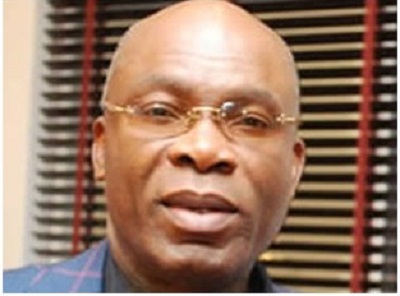News
NEBA Names Ekeh, Zinox Boss Entrepreneur of the Year

Leo Stan Ekeh, chairman, Zinox Group, has been honored as the Entrepreneur of the Year, 2013, by the Nigeria Business Elite Awards.
The honor was bestowed on him last weekend at the Civic Center, Victoria Island, Lagos, before top government functionaries, captains of industry, celebrities and the media.
The Awards which honored distinguished companies and personalities in the private and public sectors pitched three highly successful business men in the Entrepreneur of the Year category.
Nominated for the Entrepreneur of the Year were Aliko Dangote, Africa’s richest man, commodities manufacturer and merchant, and president of the Nigeria Stock Exchange; Leo Stan Ekeh, chairman, Zinox Group, Africa’s most integrated ICT firm – computer manufacturers, advanced systems integrators, digital power solutions specialists, biometric solutions and e-books and e-education specialists – and Alhaji Abdul Mutallab, director, Nigeria Economic Summit Group former Managing Director, Nigerian Arab Bank, Former Chairman, First Bank of Nigeria and Chairman Jaiz Bank.
Presenting the Award, Entrepreneur of the Year 2013, to Ekeh, the NEBA noted the pioneering role that he was playing in the IT sector from compu-graphics and desktop publishing to cloud and bandwidth management.
The citation noted the fact that his innovations in the ICT market were not based on a profit motif but on the need to structure a market that has the potential to catalyze national development. In particular, mention was made of his can do it spirit that helped in no small measure in deepening the democratic experience in Nigeria – the supply of 12,000 laptops in two weeks and 130,000 DDC Machines in 6 weeks to salvage the 2006 and 2011 Voters’ registration exercises respectively.
Describing him as a quintessential entrepreneur, NEBA noted that the Zinox Group that started modestly in 1987 as a reseller for Apple computers is today a conglomerate with many subsidiaries, each of them Number 1, in PC manufacturing, ICT solutions and distribution, support and engineering, and telecoms.
Commenting on the Award, Ekeh, thanked the Elite Business Africa Network for naming him the Entrepreneur of Year 2013. He dedicated the Award to his staff in Nigeria and overseas saying that the innovations for which he has been honored were often conceptualized and executed by them.
Ekeh pledged his commitment to narrowing the gap between the developed world and Africa through the domestication of appropriate technology.
He urged Africans to shun the preference for foreign goods in order to grow a strong industrial base for Africa.
Elite Business Africa Network (EBAN), organizers of NEBA, is a business advocacy group, comprising dedicatedly integrity-driven entrepreneurs and professionals with focus on the African business environment.
The aim of the Elite Business Africa Network (EBAN) include the following – policy framework development towards qualitative and sustainable global business integration in Africa, a propagation of business professionalism, innovation, adherence to corporate governance, probity, excellence and global best practices across Africa.
News
Senate Probes Federal Character Violations by NDIC, Others

The Senate on Tuesday deplored what it described as violations of the principles of federal character in the appointments, recruitments and promotions in some key federal institutions and agencies.

Specifically, the upper legislative chamber fingered the Nigerian National Petroleum Company Limited (NNPCL), Pension Commission (PENCOM), the Nigeria Deposit Insurance Corporation (NDIC) and several other Ministries, Departments and Agencies (MDAs) as culprits.
The matter was a subject of debate at plenary as Senator Osita Ngwu called the Senate’s attention to the alleged violations through a motion.
Ngwu’s motion, entitled “Urgent Need to Address Systemic Abuse and Ineffective Implementation of the Federal Character Principle in Nigeria’s Public Sector,” got the attention of the lawmakers.
Ngwu, who led the debate, cited Sections 14(3) and 14(4) of the 1999 Constitution, which explicitly prohibit the dominance of individuals from a few states or ethnic groups in federal institutions.
He observed that while recruitment opportunities are limited, promotions are often based solely on years of service rather than merit, leading to the continued marginalisation of certain regions.
According to him, the lack of accountability in enforcing federal character principles has compromised fairness in the public sector, with senior-level recruitments often influenced by cronyism instead of competence.
Ngwu further observed that while the federal capital principle aims to balance merit with equitable state representation, its poor implementation has negatively affected discipline, morale, and institutional efficiency.
According to him, “The federal character principle, entrenched in the 1999 Constitution of the Federal Republic of Nigeria, mandates fair representation in federal appointments to reflect the linguistic, ethnic, religious, and geographic diversity of the nation.”
He continued, “Section 14(3) and (4) of the Constitution unequivocally stipulate that ‘no predominance of persons from a few states or a few ethnic or sectional groups’ should exist within the federal government or its agencies.”
Ngwu listed the NNPCL and its subsidiaries, the Nigerian Upstream Petroleum Regulatory Commission (NUPRC), the National Agency for Food and Drug Administration and Control (NAFDAC), the Nigerian Ports Authority (NPA), PENCOM, NDIC, the Federal University of Technology Akure (FUTA), the National Library of Nigeria (NLN), the Small and Medium Enterprises Development Agency of Nigeria (SMEDAN), the Energy Commission of Nigeria (ECN), the Solid Minerals Development Fund (SMDF), and the Nigerian Nuclear Regulatory Authority (NNRA) as non comliant entities.
He accused them of consistently failing to adhere to federal character Mandates, and often bypassing regulations in their recruitment exercises.
Ngwu warned that unchecked violations of federal character laws would continue to erode the effectiveness of key legislative provisions.
He listed the affected legislative provions to include Section 14(d) & (e) of the Legislative Houses (Powers and Privileges) Act, 2017, Part I(1)-(2) of the Subsidiary Legislation 23 of 1997, and Section 11(2) of the Freedom of Information Act, 2011.
He also raised concerns about the lack of independence of the Federal Character Commission (FCC).
Ngwu observed that despite the Commission’s constitutional mandate, it remains weakened by underfunding, political interference, and a lack of enforcement power.
While approving the probe of the affected entities, the Senate directed its Committee on Federal Character and Inter-Governmental Affairs to conduct investigative hearings into their activities.
The committee is expected to submit its findings within four weeks.
News
Police Arrest 4 Bank Staff over Alleged ₦270m Fraud, Money Laundering

The Lagos State Police Command has arrested four bank employees over their alleged involvement in a sophisticated fraud and money laundering scheme that diverted over £138,924 (more than ₦270 million) from international airline accounts.

CSP Benjamin Hundeyin, command’s spokesperson, disclosed the arrests on Monday during a press briefing at the state police headquarters in Ikeja.
According to CSP Hundeyin, “The suspects conspired to siphon funds from domiciliary accounts into personal accounts before redistributing them to multiple destinations.
“The fraud was uncovered when the affected bank detected unauthorized transactions and alerted the police.”
Explaining further, the spokesperson said: “Subsequent investigations led to the arrest of the following suspects: Oluwatobiloba Olaleye, male, aged 27, was arrested on March 12, 2025, in Ogun State. A Toyota Camry 2012/2013, suspected to be a proceed of the crime, was recovered from him.
Oladunjoye Adegoke, male, aged 33, was arrested on March 13, 2025, in Victoria Island, Lagos. A Toyota Camry (Pencil Light), suspected to be another proceed of the stolen funds, was also recovered.
Further investigation led to the arrest of Austin Alfred, male, aged 38, the Supervisor of the Trade Services Department, and Jude Uzobuaku, male, aged 36, a processor in the same department. Both facilitated the illegal transfer of funds to foreign accounts.”
Police investigations revealed that the stolen funds were initially funneled into an account belonging to one of the suspects before being transferred to multiple other accounts, making it harder to trace. Authorities are now working to track down additional accomplices and recover the remaining funds.
“The suspects are in custody and will face prosecution as the investigation continues,” CSP Hundeyin stated.
News
Tony Elumelu Foundation Grants $15m to 3,000 African Entrepreneurs

Tony Elumelu Foundation (TEF) has announced a $15 million grant to support 3,000 budding entrepreneurs from 52 African countries.

Tony Elumelu, founder, TEF, made this known on Sunday in Abuja during the unveiling of the 2025 cohort of the foundation’s Entrepreneurship Programme.
He stated that each beneficiary would receive a $5,000 seed grant to kick-start their businesses.
Elumelu, who is also chairman of Heirs Holdings, Transcorp, and United Bank for Africa (UBA), reaffirmed his commitment to empowering African entrepreneurs and transforming the continent’s economic landscape.
According to Elumelu, the foundation aims to democratise opportunity across the continent, fostering economic growth and providing young Africans with access to funding and mentorship.
“We had a vision that started in 2010; one that envisions a self-sustaining Africa, driven by the energy, vision, and resilience of young entrepreneurs.
“We understand the challenges they face in contributing to Africa’s economic transformation.
“If empowered and encouraged, these young Africans can drive meaningful change,” he said.
He noted that capital alone was not enough, highlighting the importance of business education, mentorship, and training in building successful entrepreneurs.
The entrepreneurship programme, which began in 2015, originally set out to economically empower 10,000 young Africans over 10 years, each receiving $5,000 in seed capital.
“This year marks the 15th anniversary of the foundation, and we have made a considerable impact across all 54 African countries.
“In the 21st century, Africa does not need aid; what it needs is investment in its youth,” Elumelu said.
Somachi Chris-Asoluka, chief executive officer (CEO), TEF, noted that since the programme’s launch in 2015, the foundation had.disbursed over $100 million to more than 21,000 young entrepreneurs across Africa.
According to Chris-Asoluka, these businesses have collectively created 1.5 million enterprises, and generated $4.5 billion in revenue.
“Our entrepreneurs have demonstrated that ideas are the lifeblood of the African continent.
“For the 2025 cohort, we received over 200,000 applications, and from this pool, 3,000 entrepreneurs from 52 African countries will receive $15 million in funding.
“Each entrepreneur will receive a $5,000 non-refundable seed grant; this is neither a loan nor equity,” she stated.
She further assured that the foundation had a monitoring and evaluation platform in place to track progress after disbursement, ensuring that beneficiaries adhered to their approved business plans.

 Broadcasting2 days ago
Broadcasting2 days agoNGO Blasts MultiChoice for Tariff Hike in Nigeria, Slash in South Africa

 E-Business2 days ago
E-Business2 days agoOtti, Abia State Gov Promises Internet Access for all Abia Communities in 9 Months

 News2 days ago
News2 days agoNIPOST Explains Clamping Down on Illegal Logistics Services in Enugu

 Telecom2 days ago
Telecom2 days agoTelcos Mull Introduction of Different Tariff Plans for Different States

 News2 days ago
News2 days agoNESREA Urges Nigerians to Dispose Batteries Properly to Avoid Hazards

 E-Financial2 days ago
E-Financial2 days agoCITN Seeks AI to Curb Revenue Leakage in Nigeria’s Tax System

 News2 days ago
News2 days agoTony Elumelu Foundation Grants $15m to 3,000 African Entrepreneurs

 E-Financial2 days ago
E-Financial2 days agoSEC Declares War on Capital Market Fraudsters
























